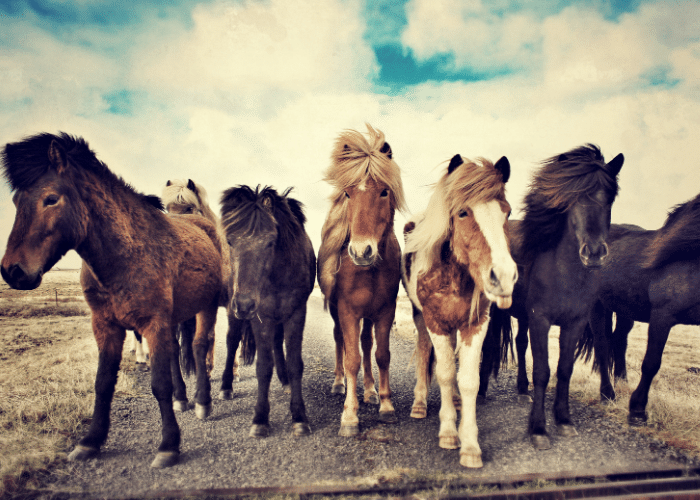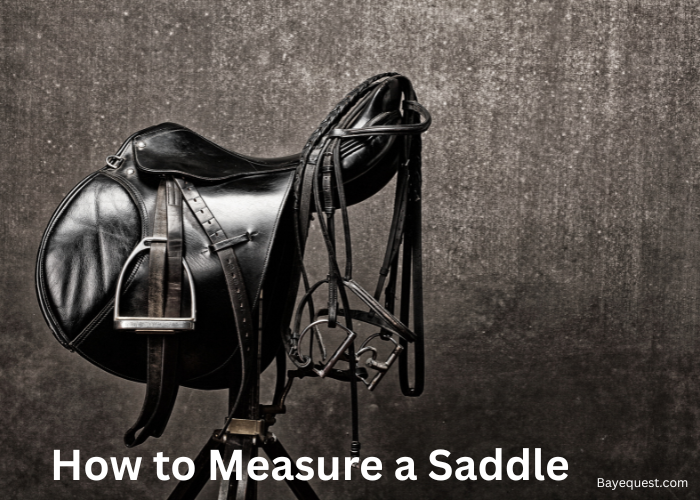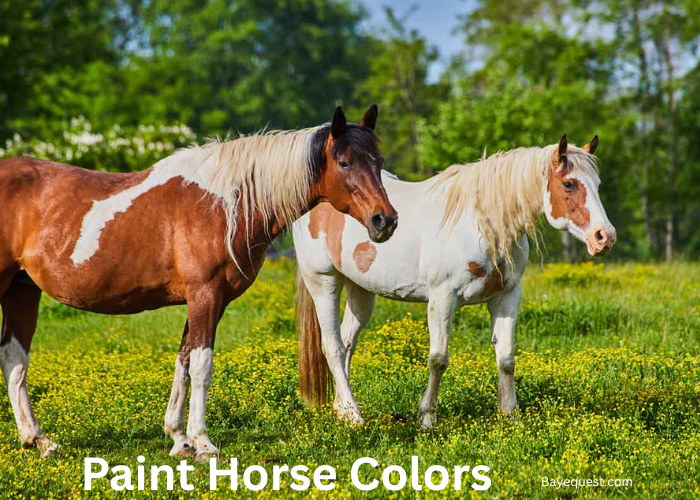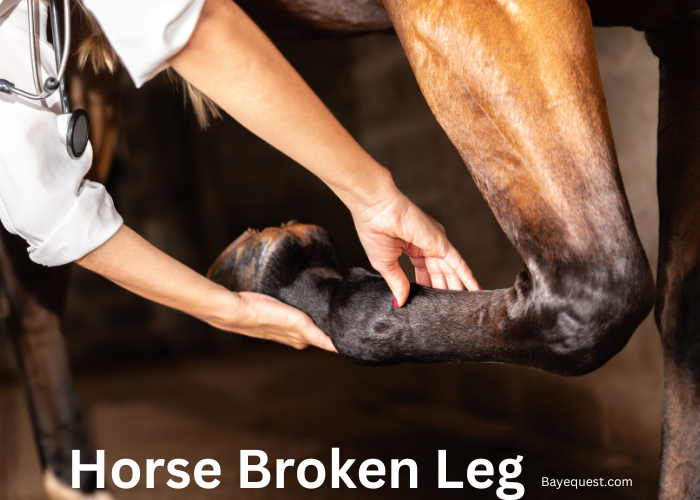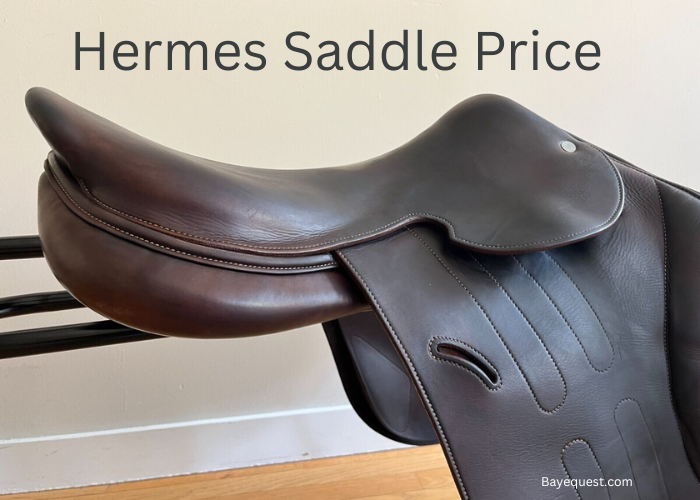Starting your horse journey is exciting, right? But here’s a twist: Picking the wrong horse breed can be a bumpy ride.
Imagine this: you’re all set for fun and adventures. Instead, you face challenges that feel a tad overwhelming.
With a sea of horse breeds out there, how do you pick? This blog is your map. It shows you 11 worst horse breeds for beginners.
We’re here to make your ride smoother. Ready? Let’s find your perfect horse pal, avoiding the not-so-easy ones. Buckle up, it’s going to be an interesting ride.
11 Worst Horse Breeds for Beginners
Here are some horses that might not be the first pick for newbies:
Arabian Horses
Imagine a horse as ancient as time, with tales winding back to desert sands. Arabians are like the athletes of the horse world, spirited and full of energy.
They’re stunning, with a distinctive head shape and high tail. But their zest and sensitivity might be a handful for a beginner.
They’re like the sports cars of horses—gorgeous but require experienced handling. These horses demand a rider who understands their sensitivity and energy.
Thoroughbred Horses
Thoroughbreds are the stars of the racetrack, born to run fast and far. Originating from 17th-century England, they have racing in their blood.
However, their speed and spirit mean they can be too much rocket for a rookie rider. They’re like race cars—thrilling but not for the faint-hearted or inexperienced. That means they can be challenging to control.
Paso Fino
From the sunny lands of Latin America comes the Paso Fino, with a dance-like gait that’s smooth and elegant. They’re bred for their unique movement, but this same specialty can be tricky for new riders to adjust to.
Think of them as the ballet dancers of the horse world—graceful, but it takes skill to match their rhythm.
Read also: Paso Fino Horse Breed Price.
Mustang Horses
Mustangs are the wild cards, literally. Running free in the American West, they’re symbols of freedom and resilience.
Capturing that wild spirit can be challenging, though. Taming a Mustang is not for beginners. It’s like trying to pilot a plane with no flying experience.
Training a Mustang is not just about skill but about building trust. They offer a journey back to the roots of equine partnership, challenging yet rewarding, for those ready to listen and learn.
Akhal Teke Horses
These horses are like the supermodels of the horse world.They hail from Turkmenistan with a metallic sheen to their coat.
Known for endurance and speed, Akhal-Tekes are as loyal as they are beautiful. However, their intensity and sensitivity make them better suited for experienced hands.
Shire Horses
The gentle giants. Originating from England, Shires are among the largest horses. They’re strong, calm, and friendly but their sheer size and strength can be overwhelming for newbies.
Imagine driving a truck for the first time—it’s a lot to handle. That’s exactly about riding Shires.
Belgian Draft
Belgians are like the powerhouse workers of the horse world. They have an incredible strength and kind nature.
Originating from the Brabant region of Belgium, these horses are reliable but their size and power demand respect and experience.
Percheron Horses
French elegance meets power in the Percheron. Originating from France, they’re versatile, strong, and have a calm demeanor.
Yet, their brawn and energy levels mean they’re best paired with someone with some experience.
Trakehner Horses
Trakehners are the aristocrats, born in what is now Poland and East Prussia. They’re known for their grace, intelligence, and athleticism.
But, with their refined sensitivity, they require a rider who can match their finesse. They’re like driving a luxury car—you need to know the controls.
Friesian Horses
From the picturesque lands of the Netherlands come the Friesians. They have majestic black coats and flowing manes.
They star in movies for their looks but need regular grooming and care. Their beauty doesn’t mean they’re easy. They’re like high-maintenance sports cars that require constant attention.
You already know what it’d mean for a newbie to drive a sport car, right? That’s just it with this breed.
Interesting read: Reasons Why Horses Haves Manes.
Australian Brumbies
The Brumbies roam wild in Australia, rugged and free. They’re survivors, adapting to harsh landscapes.
Catching and training a Brumby is a real adventure, but it’s a project filled with challenges. They’re like off-road vehicles—tough to tame but rewarding for the experienced.
Alternative Breeds Suitable for Beginners
Let’s switch gears and explore some friendlier terrain with breeds that welcome beginners with open hooves.
Quarter Horse
The Quarter Horse is the all-rounder. Think of it as your best friend on four legs. They’re calm, easy to train, and versatile.
Perfect for beginners who want to try everything from trail riding to competitions. They’re the reliable type, always ready to learn and please.
Appaloosa
The Appaloosa boasts a history intertwined with the Nez Perce Native American tribe of the Pacific Northwest, USA. Renowned for their distinctive, spotted coat, Appaloosas were bred for their stamina and hardiness.
They’re not just about looks; they’re sturdy, friendly, and have a great temperament. They’re like the adventurous friend who’s always up for anything, making them great for beginners.
Clydesdale
Imagine a gentle giant. That’s the Clydesdale. They may be big, but they’re as kind and gentle as horses come.
They’re like the big, friendly neighbor who’s always there to help. Their size might seem intimidating, but their patient nature makes them a great match for beginners.
Morgan
Morgans are like the jack-of-all-trades in the horse world. They’re adaptable, friendly, and love to learn.
Think of them as the eager student who’s always keen to please. Their willingness and kind nature make them perfect for beginners eager to dive into horse ownership.
Tennessee Walking Horse
The Tennessee Walking Horse breed is all about smooth sailing. They’re known for their unique, smooth gait, which makes for a comfortable ride.
Imagine a leisurely stroll in the park – that’s riding a Tennessee Walker. They’re calm and friendly, ideal for beginners who prioritize comfort and ease.
Welsh Pony
Welsh Ponies are the compact powerhouses, perfect for young riders or those new to the horse world.
They’re spirited without being overwhelming and are as versatile as they are reliable. Think of them as the small but mighty friend, ready for adventures and always dependable.
Irish Cob (Gypsy Vanner)
The Irish Cob, also known as the Gypsy Vanner, has its origins in the British Isles. They were bred to pull the vardoes in which the community traveled, requiring a breed that was not only strong but also gentle and good-natured.
Their unique appearance and calm demeanor make them a standout choice for beginners.
Interesting read: Best Horse Breeds for Beginners.
Tips for Choosing the Right Horse Breed
Choosing the right horse is a big decision, especially for new riders. Here are some tailored tips to help you find your ideal equine companion:
Middle to senior-aged
Middle to senior-aged horses (10 to 20 years old) often have a calmer demeanor. This has developed through years of experience and training.
They’re less likely to be startled by new or unexpected situations. Therefore, they are more reliable for riders who are still building their confidence.
Seek out horses known for their steady nature. These horses are more likely to provide a consistent and reassuring presence.
Not green or green broke
“Green” or “green broke” horses are in the early stages of their training. They’re still learning what’s expected of them and can be unpredictable.
A horse that has completed its training is more adaptable and understanding of commands. This makes them easier for beginners to handle, as they’re more forgiving of mistakes.
Has lots of experience in different environments
Horses that have been exposed to a variety of environments and situations are less likely to spook or become nervous in new settings. This exposure includes different terrains, noises, animals, and even large crowds or events.
Inquire about the horse’s history and experiences. A horse that has been part of shows, competitions, or trail riding in diverse settings might be more adaptable and confident.
Minimal health issues
While it’s normal for older horses to have some health considerations, you need to look for a horse with manageable or minimal health issues.
Ongoing health problems can affect the horse’s quality of life and also become costly and emotionally taxing.
Always request a pre-purchase veterinary exam. This can help identify any current or potential health issues.
Related read: Horse Skin Diseases and Conditions.
What Are the Most Important Riding Skills for Beginners to Learn?
For beginners, diving into the world of horseback riding is both thrilling and a bit daunting. However, focusing on a few essential skills can make the journey smoother and safer.
Here’s a rundown of the most important riding skills that beginners should aim to learn:
Basic positioning
- Learning the correct posture is foundational. Sitting up straight, with shoulders back and relaxed, helps maintain balance.
- Keeping legs stable and gently against the horse’s sides avoids sending unintended signals.
- Holding the reins correctly, with gentle, yet firm hands, allows for subtle communication with your horse.
Understanding horse behavior
- Knowing basic horse body language helps in anticipating the horse’s actions and mood.
- Learning how to calmly respond to different behaviors, like spooking, is crucial.
Basic control and steering
- Beginners must learn how to start, stop, turn, and move the horse at different paces accurately.
- Understanding how to use reins for direction and legs for movement and speed control is essential.
Mounting and dismounting
- Doing this correctly ensures both rider and horse safety. Beginners should practice getting on and off the horse with ease.
Walking and trotting
- Mastering the walk before moving on to faster paces builds confidence and skills.
- Learning to trot, including how to sit or post to the trot, is a key next step after mastering the walk.
Balance and stability
- Developing a good sense of balance helps riders stay secure in the saddle at all paces.
- Building core strength enhances stability and endurance in the saddle.
Basic care and grooming
- Understanding the basics of horse care, including grooming, feeding, and health checks, fosters a strong bond between horse and rider.
Safety first
- Wearing appropriate safety gear, like helmets, and learning how to fall safely can prevent serious injuries.
- Knowing what to do in emergencies, such as if the horse bolts, is critical.
- Here’s a horseback riding equipment list that you need.
Patience and persistence
- Horseback riding requires patience. Progress might be slow, but persistence pays off.
- Spending time with the horse outside of riding builds trust and improves communication.
Conclusion
We’re ending our look at 11 tough horse breeds for beginners. Remember, every horse is unique.
Some breeds may seem too lively or tough for new riders. But, it’s all about the bond you share.
Horse riding is more than picking a breed. It’s about learning, understanding, and respect. The best lessons can come from the toughest challenges.
So, start your horse journey with an open mind and patience. The perfect horse for you is out there. One that gets you and is ready for adventures.
Cheers to finding your horse mate and the amazing experiences you’ll have together.




